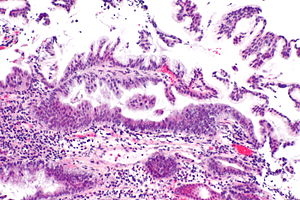Difference between revisions of "Foveolar type dysplasia"
Jump to navigation
Jump to search
| Line 30: | Line 30: | ||
| Tx = | | Tx = | ||
}} | }} | ||
'''Foveolar type dysplasia''', also '''foveolar dysplasia''', is a form of [[dysplasia]] that arises from the foveolar cells, typically seen in the [[stomach]]. It | '''Foveolar type dysplasia''', also '''foveolar dysplasia''', is a form of [[dysplasia]] that arises from the foveolar cells, typically seen in the [[stomach]]. It may be subtle to unaccustomed eyes. | ||
It is also described as '''non-adenomatous dysplasia''', '''type 2 dysplasia''' and '''foveolar/hyperplastic type dysplasia'''.<ref name=pmid20228780/> | It is also described as '''non-adenomatous dysplasia''', '''type 2 dysplasia''' and '''foveolar/hyperplastic type dysplasia'''.<ref name=pmid20228780/> | ||
Revision as of 16:53, 23 October 2017
| Foveolar type dysplasia | |
|---|---|
| Diagnosis in short | |
 Foveolar dysplasia of the duodenum. H&E stain. | |
|
| |
| Synonyms | type 2 dysplasia, foveolar dysplasia, foveolar/hyperplastic dysplasia |
| LM DDx | benign foveolar epithelium, gastric heterotopia (if not stomach), benign ampullary epithelium, hyperplastic polyp |
| Site | stomach, duodenum (esp. ampulla of Vater), esophagus |
|
| |
| Syndromes | familial adenomatous polyposis |
|
| |
| Prevalence | not common |
| Other | may be subtle |
Foveolar type dysplasia, also foveolar dysplasia, is a form of dysplasia that arises from the foveolar cells, typically seen in the stomach. It may be subtle to unaccustomed eyes.
It is also described as non-adenomatous dysplasia, type 2 dysplasia and foveolar/hyperplastic type dysplasia.[1]
General
- Precursor to adenocarcinoma.
Microscopic
Features:
- Tall columnar cells with basal nuclei in a villiform architecture.[1]
DDx:
- Benign foveolar epithelium - seen in stomach and ampulla of Vater.
- Gastric heterotopia.
- Hyperplastic polyp.
Images
www:

